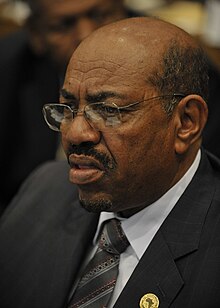Omar al-Bashir
President of Sudan from 1989 to 2019
(Redirected from Omar Bashir)
Omar Hassan Ahmad al-Bashir (born January 1, 1944) was the President of Sudan and the head of the National Congress Party. He came to power in 1989 when, as a brigadier in the Sudanese Army, he led a group of officers in a military coup that ousted the democratically elected government of Prime Minister Sadiq al-Mahdi after it began negotiations with rebels in the south. Since then, he has been elected three times as President in elections that have been under scrutiny for corruption. In March 2009, al-Bashir became the first sitting president to be indicted by the International Criminal Court (ICC), for allegedly directing a campaign of mass killing, rape, and pillage against civilians in Darfur.

| This article about a political figure is a stub. You can help out with Wikiquote by expanding it! |
Quotes
edit- The confrontation would be better and cheaper for us than to sign that we accept U.N. forces in Darfur.
- About the Darfur conflict, Sudanese President Confrontation Is Million Times Better August 2006
- One of the things (that I regretted the most was) that has an impact on these two decades and more is what happened after we (Sudan) signed the comprehensive peace agreement (with South Sudan). We signed this agreement. We genuinely implemented it, and we gave our brothers in South Sudan more than is entitled to them according to the peace agreement. I fought for years in South Sudan for the unity of Sudan. I was a commander in the fields, fighting for the unity of Sudan. As a politician, I worked very, very hard in order to maintain the unity of our country. That was my aim. Of course, the result came negative to what I was looking forward to happen after all these efforts, after all these years of hard work and labor. It's one of the things that I forget because Sudan was divided in two.
- Omar al-Bashir (2014) cited in "Washington Post interview with Sudanese President Omar al-Bashir" on The Washington Post, 23 December 2014
Quotes about
edit- M. President, the sad truth is, what is happening in Sudan is in large part the result of a lack of accountability for previous abuses. Many of those involved in today’s conflict committed war crimes in the past and were never held accountable. Maybe things would be different if the former dictator al Bashir had been tried at the Hague. Maybe the SAF would have reformed if high ranking officers been held accountable for atrocities. Maybe the RSF would not exist if the Janjaweed had been accountable for their crimes in Darfur. Maybe General Hemedti had not be getting flown on an Emirati jet and welcomed by African heads of state— things might be different.
- Ben Cardin, "We Cannot Be Silent About Sudan," Delivered on the floor of the U.S. Senate, U.S. Capitol, Washington, D.C., March 22, 2024; Vital Speeches of the Day [s. l.], v. 90, n. 6, p. 140–141, 2024
- Of the dictators included in this book, the first three, Omar al-Bashir of Sudan, Kim Jong-il of North Korea, and Than Shwe of Burma, stand out as being a cut above the others in terms of venality. Bashir is the only dictator currently in power who is responsible for the killing of hundreds of thousands of people. While the media occasionally cover the massacres in Darfur in western Sudan, they usually do so in the context of it being a “humanitarian tragedy,” while Bashir himself has remained little known and has generally escaped condemnation. In fact, he has the power to prevent the destruction of villages in Darfur, just as he had the power to prevent the killing and enslavement of innocent people in southern Sudan. In both cases, he has been an enthusiastic supporter of the slaughter.
- David Wallechinsky, Tyrants: The World's 20 Worst Living Dictators (2006), p. 2